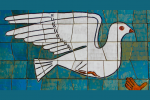April 22, 2015
Liturgy: Something Other Than Work
 The day’s events had me going from an early morning meeting, then answering several emails about an ongoing project, to a hospital call in the city, to, at last, an Evensong at the Virginia Seminary to kick-off their new Center for Liturgy & Music. It was a full day and an exciting one, at that.
The day’s events had me going from an early morning meeting, then answering several emails about an ongoing project, to a hospital call in the city, to, at last, an Evensong at the Virginia Seminary to kick-off their new Center for Liturgy & Music. It was a full day and an exciting one, at that.
Arriving early at the Virginia Seminary – thinking I could steal away a few hours in the library and get some more work done – I noticed a sign on a door saying that Emmanuel, a brother from the Taize community, would be stopping into the seminary’s new chapel that afternoon to lead some prayers and talk about the shape of that ecumenical, contemplative religious community in the Burgundy region of France. That was an opportunity I didn’t want to miss, so I gladly left the computer bag in my car and popped over to the chapel.
It was a quick visit, one of many Brother Emmanuel was making through the Washington region, marked by some words from him and some back-and-forth questions. Then we moved to a transept in the chapel and gathered for singing and Taize prayer. “I will sit among you,” Emmanuel said to the large group who had gathered. “For in Taize we do not like to put the musicians or a leader in front of the people.” We sang. We prayed. We sat in silence. We dwelt in God and, as Brother Emmanuel said, “we renewed ourselves in the God of love.”
“There is so much we do in worship, in liturgy,” Emmanuel said at one point: “we kneel; we sit; we stand; we recite; we move from piece to piece. We do not often allow ourselves to pray.” That’s the genius of Taize, and so many other forms of liturgical music and art which have flowed from Brother Roger’s mid-20th century vision of a worldwide, ecumenical movement of Christians seeking after reconciliation through common prayer. “We do not often allow ourselves to pray,” Emmanuel summarized his movement so simply.
How true that is, I thought, and how indicative of my own day’s plans – rushing from event to event, letting my calendar move my day, making calls and meeting appointments, accomplishing projects and checking off tasks on my list. How indicative is Emmanuel’s statement of the ways in which contemporary life, indeed today’s Christian ministry is so wrapped around work; good work, no doubt, essential work, too. But work which is too absent, too many times, of prayer.
That old saying that the word liturgy can be translated, loosely, as “the work of the people” is being called into question these days. Yes, the Greek word does have within it two root words –laos, meaning the people, and ergas, meaning a work – but many suggest that it never really meant “the people’s work” but, instead, indicated something like a public service, something for the people such as a civil project like a bridge or road construction. It was not the people’s, necessarily, but something for the people, something funded by a generous benefactor. Someone was underwriting this work so that the people could find their lives more enriched, a work that would lead to greater human flourishing.
Some of the questions we are asking ourselves as part of our discussion about worship and music and the arts of liturgy here at St. George’s, Valley Lee are leading us into some uncharted waters. Is our church’s liturgy too restrictive, too focused on accomplishing certain things along the way toward an end? What flexibility do we have to re-focus and shift, moving away from tasks and toward feasting in God? Does a bulletin, for instance, need subheadings (such as found in most every Episcopal church bulletin, I’ll bet) or could the gentle, subtle movements of the worship experience, not necessarily the worship service, guide the people? Put bluntly: does a service bulletin need to say “Sermon” or could the person called upon to offer some interpretation at that point in the worship experience simply stand up and offer words? Could we sing more and talk less? Could we introduce silence in greater measure, and what would we want to or need to give up in order to do so?
These questions we’re asking are only, in part, about worship and liturgy. Ultimately, they are, as Brother Emmanuel put it, about life and about the priorities of our lives: how boldly we are willing to move in a reconciling direction toward the God who desires all things and loves all things, even the tasks on our to-do lists and our so-called work.
Don't miss a blog post! Subscribe via email or RSS, using the grey box on the upper right.





